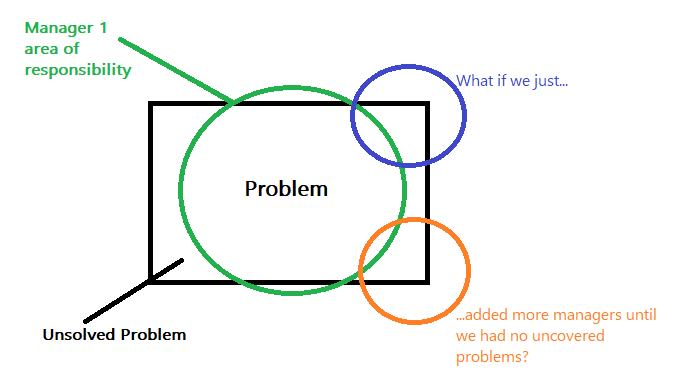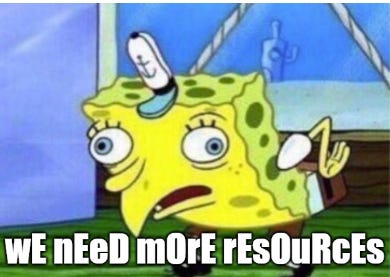Managers Should Do Things
None of your managers should ever "just" manage.
TLDR: Managers of every level should have individual contributions that they bring to the team, and these should go beyond simply sharing information, context/prioritisation, and administration.
My favourite thing in the world is watching managers managing managers managing managers managing managers. If you haven’t got a manager for that, does it really exist? So many managers. A manager for every thing and for every thing, a manager.
The world is a square-shaped hole
Every organisation is built on a simple choice. You can try to get everything under a managerial umbrella, or you can leave some things unmanaged.
Reality is a square-shaped hole which you are trying to cover with circular managerial areas of oversight. If you attempt to cover every part of the square, you will end up with overlapping circles and a complexified work environment, but you will - on paper - have accountability.
If you choose the opposite approach and leave some parts of the square uncovered, you will - on paper - fail maximise your potential and will almost certainly have problems crop up in the neglected gaps.

I want to talk today about this type of problem and how to better maintain a functioning organisation that is less likely to waste its own time.
We know from the previous post on this topic that management is the craft of Applying Effort, Adding Leverage, and Solving Problems for an organisation. We also know that management layers tend to proliferate, and have seen the “Year of Efficiency” post from Meta and the “increase the ratio of individual contributors to managers by 15%” post from Amazon correcting some of these.
Managers should do things
In my view, once you are established in your role and the team is working, all managers should remain individual contributors to some extent. The reasons for managers to contribute are straightforward:
a) You bring important units of work to the team, reinforcing the team dynamic.
b) You viscerally understand the time/effort sinks that the team runs into. “Why do we spend time on this? This is stupid.” → “Yeah, we know.” It keeps the team’s approach relevant.
c) It reinforces the expectation of contribution. Whether you think of this as “servant leadership” or whatever, the reality is that if you have somewhere between one-tenth and one-fifth of your organisation (i.e. your managers) just hanging out administrating, that’s a huge chunk of time and money being used suboptimally and it shifts your centre of gravity. What you do is who you are.
d) It demonstrates the standard. If you critique your team’s work but they never get to see if you are good at yours, this undermines motivation and team coherence.
e) It keeps you engaged. The simplest definition of a manager is that they “close the gap between an organisation and its context”. If you are not producing something, this gap has a tendency to get wider.
f) It’s an easy way to start a dialogue. Getting someone to tell you the flaws in your management style is very(!!) difficult. Showing someone work you produced and asking “what do you think?” is a much, much easier place to start - we are discussing the work, not the boss - and can be used to build trust to have the more difficult conversations.
g) It makes it easier to stop doing things. Half of the job of management is realising what not to do and this is always the half that people forget. It’s so so easy to focus on doing more stuff or to abstract yourself from the day-to-day. What’s John working on? Oh he’s doing The Big And Complex Thing. Cool how is The Thing going? Yeah it’s going well. Maybe we should add a 30min progress check-in? Sure why not. Excellent, my work here is done. Lol!!!
h) It adds flexibility. Generally speaking, the organisation and team should not be designed around the assumption of manager as a part-time IC; managers should manage. On the other hand, when a big opportunity arises or crisis strikes and the team is completely snowed under, what are you gonna do? “Wow my team is snowed under, what a shame, if only there was another pair of hands around that could help? Oh well, nothing I can do, we need more resources.” Lol!!!!!!
Note that I did not say administration or traditional management activities are not valuable or useful. Removing blockers, prioritising and focusing effort, teaching, communicating and aligning, all of these things are very valuable and should be your first focus.
The special exception of Individual Contributor promotion
A failure mode for newly promoted ICs in management is continuing to contribute individually because it’s what they know, neglecting the new disciplines they should be learning.
At larger organisations or with larger teams, newly promoted ICs should exclusively manage and make ~no individual contributions for 3-12 months while they get the hang of it.
Small orgs still need their managers to contribute. The best way I have found to address this is: you must do your management work *first* every day, and that includes delegating and training to remove all of the “only I can do this magic thing” crutches that are so tempting to lean on.
Once you have solved these, to get to the next level, find ways to bring your own contribution to the table.
What things should a manager do?
This is a little trickier because it depends on the context of your role/organisation. Here are some broad examples offhand:
Recruiting/networking. If your organisation needs talent, there are worse ways to spend your time than knowing who is important in the space, who built what, what motivates whom, and whomst might be convinced to shift with the right nudge.
(Ever met someone whose entire talent pipeline came from social media? I have. One engineering manager I met last year networks heavily. His business partner asked how we met and burst out laughing when I said “Twitter”. When I asked what was funny, he told me all of their hires at their last company came from Twitter. That’s a contribution!)Prototyping/testing. One thing the software product domain does really well is turning the administrative or creative roles (product manager, designer) into a valuable contributor through the creation of artefacts, qualitative and quantitative experimentation and so on. This can be much broader than you think; it could be anything from new sales materials, customer FAQs, marketing headlines, press releases, A/B tests, you name it.
Special projects/innovation. As manager you are (should!) be in better position to know what the rest of the company is up to, what other people are thinking about and working on. You also have disproportionate ability to make connections and control your time, and can contribute to other teams. If you are an organisation that needs innovation, you should seriously think about doing more of this.
Training. Andy said so - Training Is The Boss’s Job. I’m reluctant to include this one because it’s more of a traditional managerial task - but to train well (specific, actionable, with clear outcomes) you have to actually understand the job people are doing very thoroughly. Most companies still don’t train people, and the reality is that creating training programs is a big contribution that takes, time, effort, knowledge, and thought.
Training is doubly important because most of the time, managers can get away with not creating a training program, skate under the radar, and blame the failure of new hires either on the hiring process or the individual. (Five years ago in another role, one of the main things colleagues still remember about me is the training program I created for new hires which cut onboarding time by more than six months.)
You can take this philosophy as high up the org chart as you like. People love Steve Jobs stories, of which the Gorilla Glass example is archetypal. Stevey J was good because he contributed, in addition to his other qualities.
The bottom line
Companies perform better when managers contribute, perhaps not least because the manager experiences the reality of their own organisation. The tension between delivery and administration MUST be maintained and who better to do this than a manager who knows how to contribute?
Stopping at “just” managing (prioritisation, context, goal setting, performance management) is not sufficient to be great.
Sure, a large chunk of the role is essentially directing traffic, but there is more to it, so if you’re a manager - what’s your contribution?
Best of luck.
Open invite: Let’s get lunch! Every Tuesday I have lunch with a new person I’ve met on the internet. If you’re in the Sydney CBD, let’s catch up.
You can send a message here or just reply to the emails from Substack.


